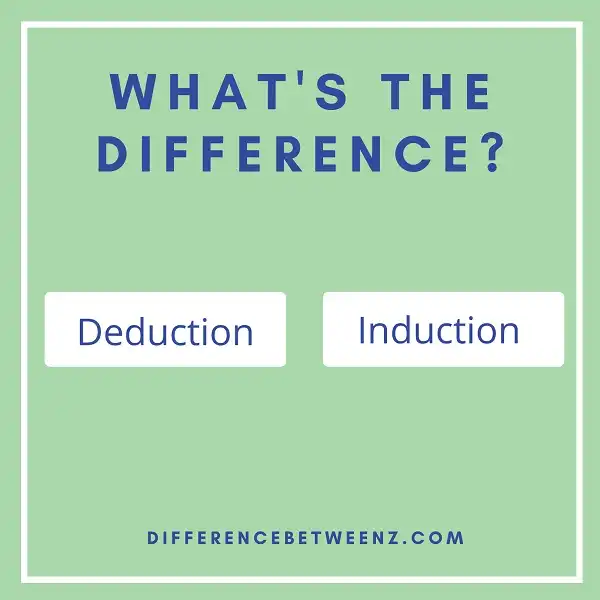When it comes to the concept of deduction and induction, there is often a lot of confusion among individuals. The key difference between the two is that while deduction is based on a set of logical rules, induction relies on observed facts. In general, the deduction is seen as being more reliable than induction; however, this isn’t always the case. Let’s take a closer look at each of these concepts to see how they work.
What is Deduction?
The deduction is a method of reasoning in which we arrive at a conclusion based on certain pieces of evidence or information. Deductive reasoning is often used in the legal field, as attorneys attempt to piece together a series of events to prove their case. In Deduction, our goal is to start with a set of premises (or evidence) and use those premises to logically arrive at a conclusion. For Deduction to be successful, the premises must be true and the logic must be valid. If Deduction is done properly, it can be a very powerful tool for discovering new information or reaching sound conclusions. The deduction can also be used in philosophical arguments, as philosophers attempt to reason their way to truth. When used correctly, Deduction can be a valuable tool for learning and discovery. However, if Deduction is not done properly, it can lead to false conclusions. Therefore, it is important to be careful and thoughtful when using Deductive reasoning.
What is Induction?
Induction is the process of deriving a general law or principle from particular facts or instances. For example, one might observe that all the swans they have ever seen are white and then conclude that all swans are white. This is an example of inductive reasoning. Inductive reasoning is often used in science when developing theories. A scientist might make numerous observations and then develop a theory that explains those observations. Inductive reasoning is also used in everyday life.
For example, if you notice that your car starts making a strange noise after you go over a bump, you might conclude that the bump caused the noise. In this case, you are using induction to draw a conclusion about cause and effect. Induction is a type of logical reasoning that is based on making inferences from observations. It is important to note that induction cannot be used to prove that something is true; it can only be used to show that something is probably true.
Difference between Deduction and Induction
Deduction and induction are two methods of reasoning that are commonly used to draw conclusions. The deduction is a top-down method of reasoning, in which you start with a general principle and then apply it to a specific situation. Induction is a bottom-up method of reasoning, in which you start with specific evidence and then draw a general conclusion from it. The deduction is typically used when you are dealing with abstract concepts, while induction is typically used when you are dealing with empirical evidence. The deduction is considered to be more reliable than induction because it is less likely to be affected by biases and fallacies. However, induction is often more useful in practice, because it can be used to make predictions about the future based on past data.
Conclusion
In philosophy, there is a distinction between Deduction and Induction. Deductive reasoning proceeds from the general to the specific. If all of the premises are true, then the conclusion must be true. Inductive reasoning starts with specific observations and moves to broader conclusions. While it is not guaranteed that an inductive argument will be correct, it is more likely than deduction.
The scientific method relies on induction, as scientists make observations and form hypotheses based on those observations. When testing these hypotheses, they rely on deductive reasoning to see if their original hypothesis was correct. It’s important for marketers to understand this difference because it impacts how we should be gathering data and make decisions about our products or services.


